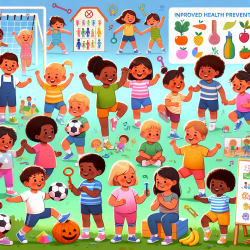Revolutionizing Obesity Prevention in Preschoolers: The Growing Healthy Study
In a world where nearly one in five 4-year-olds in the United States are obese, the need for effective prevention strategies is more urgent than ever. Low-income children are particularly vulnerable, being almost twice as likely to face obesity compared to their middle or upper-income peers. The Growing Healthy study introduces a novel approach, focusing on enhancing self-regulation to combat obesity in preschoolers, particularly those in Head Start programs.
The Study's Groundbreaking Approach
The Growing Healthy study, a randomized controlled trial, evaluated two interventions aimed at preventing obesity in 600 low-income preschoolers. The interventions were delivered in collaboration with Head Start programs, targeting both children and their parents. The first intervention, the Preschool Obesity Prevention Series (POPS), focused on promoting evidence-based obesity prevention behaviors. The second, a combination of POPS and the Incredible Years Series (IYS), aimed to improve self-regulation among preschoolers.
Why Self-Regulation Matters
Research suggests that children who can better self-regulate are less likely to eat impulsively in response to stress. This is particularly important as stress can lead to increased appetite and a preference for high-sugar and high-fat foods. The study hypothesized that enhancing self-regulation skills in children could be a unique and effective intervention to prevent childhood obesity.
Implementing the Findings in Practice
For practitioners, incorporating self-regulation strategies into obesity prevention programs can be a game-changer. Here are some practical steps to consider:
- Integrate self-regulation exercises into daily routines, such as teaching children to calm down without using food as a coping mechanism.
- Engage parents in learning about self-regulation and its impact on eating behaviors, providing them with tools to manage their child's behavior effectively.
- Collaborate with community-based educators to deliver comprehensive programs that address both dietary habits and self-regulation skills.
Encouraging Further Research
The Growing Healthy study opens the door for further exploration into the relationship between self-regulation and obesity prevention. Practitioners are encouraged to conduct their own research to validate and expand upon these findings. Consider the following areas for future study:
- Long-term effects of self-regulation interventions on obesity rates in diverse populations.
- The role of parental involvement in enhancing the effectiveness of self-regulation programs.
- Comparative studies on different self-regulation techniques and their impact on childhood obesity.
Conclusion
The Growing Healthy study provides valuable insights into a promising approach for preventing obesity in preschoolers. By focusing on self-regulation, practitioners can potentially improve health outcomes for children, particularly those in low-income settings. This study highlights the importance of innovative, data-driven strategies in tackling the obesity epidemic.
To read the original research paper, please follow this link: Enhancing self-regulation as a strategy for obesity prevention in Head Start preschoolers: the growing healthy study.










